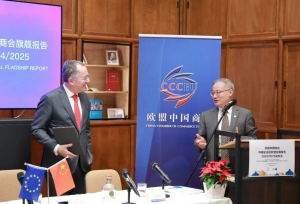
On December 9, 2024, the China Chamber of Commerce to the EU (CCCEU) and global management consulting firm Roland Berger jointly released the Chamber’s annual flagship report, Facing Challenges, Moving Forward – Report on the Development of Chinese Enterprises in the EU (2024/2025), in Brussels, Belgium. The report highlights that “uncertainty” has become the key word for Chinese enterprises operating in the EU, with 78% of surveyed companies believing that the current business environment in the EU has become more uncertain. Chinese companies generally believe that the increasing politicization of the business sector should not be underestimated and are hoping for the EU to create a fair, just, and predictable market environment for Chinese enterprises operating in the region.
The report is based on a four-month survey and in-depth interviews with approximately 200 Chinese companies operating in the EU. It includes calls for the EU to respect the global division of labor in the industrial and supply chains, use trade tools and trade remedies cautiously, and avoid the overuse of “economic security” policies. It also provides 283 specific recommendations for improving the EU business environment and promoting EU-China cooperation.
The report notes that China and the EU are each other’s second-largest trading partners. According to EU statistics, the bilateral trade between China and the EU reached €740 billion in 2023, with the EU’s trade deficit with China narrowing by 27% compared to 2022. The trade structure between China and the EU continues to optimize, with high-tech products accounting for nearly 30% of the total trade volume. The category with the largest increase in imports from China to the EU was motor vehicles, with an import value of €12.9 billion. The largest export category from the EU to China was also motor vehicles, with exports worth €19.4 billion, resulting in a trade surplus of €6.5 billion for the EU in this sector. Data from China’s Ministry of Commerce and others show that in 2023, China’s investments in the EU were mainly directed to Luxembourg, the Netherlands, and Sweden. By the end of 2023, China’s direct investment stock in the EU reached $102.4 billion (€91.7 billion), accounting for 33% of China’s direct investment in developed countries, ranking first. Chinese enterprises have established over 2,800 direct investment companies in the EU, employing more than 270,000 local staff.
The report calls for China and the EU to cooperate closely in the face of the current complex geopolitical landscape and challenging economic environment, avoiding the politicization of trade and economic issues, and jointly maintaining an open, fair, and predictable business environment. The foundation for China-EU economic and trade cooperation is deep, and the complementarity between the two sides is strong, with both benefiting greatly. The report urges the EU to adopt more open and inclusive policies, respect the global division of labor in industrial chains, avoid excessive emphasis on “economic security,” and create favorable conditions for the development of Chinese enterprises in Europe. At the same time, Chinese enterprises should actively adapt to EU market rules, enhance their competitiveness, and establish closer partnerships with local companies to jointly promote the long-term, stable development of China-EU economic and trade relations.
As China and the EU approach the 50th anniversary of their diplomatic relations, Chinese enterprises in the EU hope for strengthened exchanges in trade, technology, culture, tourism, and other areas, increased political trust, deepened comprehensive strategic partnerships, and joint support for multilateralism and free trade to tackle global challenges together.
Source: EU-China Chamber of Commerce
